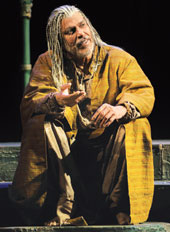 |
| Rudraprasad Sengupta as Yayati in Madhavi |
Only a brew of old world passion and new-age professionalism can save theatre in Bengal feels Rudraprasad Sengupta, who turns 75 today. After 49 years in the profession, he still strives to be “a good person, because one cannot otherwise hope to be useful to theatre”. Excerpts from an interview:
People generally come to theatre to act. Yet you were doing a lot of work for Nandikar, giving shape to Ajitesh Bandyopadhyay’s ideas, before you actually began acting and even that was to fill in for someone…. It doesn’t seem to make much difference to you if what you are doing is just drafting letters, arranging for someone’s boarding, adapting plays or directing productions like Antigone, Kharir Gandi,Sankhapurer Sukanya, Gotraheen...
No, I began acting as a child in Monimela productions and later for the CU production Inspector Calls, in which I played the inspector. But I started acting for Nandikar as a nondescript drunk in Will Shakespeare: An Invention… and then as you say I was forced to appear in the 1963 production of Natyakarer Sandhane Chhoti Charitro.
But you may see me as a facilitator and guardian or (smiling) an odd-job man. But that is because I love theatre in its totality. To me the liaison, the running around for halls, checking on ticket sales, is an integral part of doing theatre. People don’t always realise how important these behind the scenes work is.
Even if our theatre could afford specialists, a holistic approach is important. It makes a lot of difference if an actor knows about light and music and all the rest. While doing Nati Binodini, I discovered how dialogue delivered in sync with light movement made all the difference. In 1970, I was the only one who knew that Nandikar’s project of doing regular shows at Rangana would soon run aground because unlike the others I was not moved by passion alone I was aware how economically unsound such a decision had proved to Utpal Dutt.
Bangla Natyamancha Pra-tistha Samity, the attempt by Sombhu Mitra and others to create a cultural centre around theatre failed and your Calcutta Repertory Theatre of the 1980s nev-er took off. But now with the Minerva Natya Sanskriti Charcha Kendra sputtering into action and the pro-mise of studio theatres… would you say that good times are here for theatre?
Not at all. Theatre still does not feature in the turnover for the entertainment industry. The times are antisocial and it is all the more difficult for something like theatre which cannot be practised in isolation. Theatre demands a profound sense of caring not only for oneself but for the audience and your fellow travellers as well.
But today there is a tendency to grab every opportunity that presents itself. Many actors (even from our group) don’t stop to consider the value of the time and energy devoted to their training and even before they have gained maturity or found their true strengths they start working professionally for other groups. This never allows the actors to overcome their inadequacies but also harms both groups because the actor doesn’t give anything back to his original group and his presence in the new group impedes the development of actors who now feel there is no point in cultivating their skills.
Even directors sometimes irresponsibly accept assignments outside their group. I must believe that they are thinking only of themselves. Theatre cannot survive without love. We still need a certain degree of loyalty (if not a Casablanca-like commitment, at least a primary obligation a familial sense of belonging).
So, I have my doubts about the repertory. Can we all really maintain an affectionate-neutrality? Can we give the actors remuneration comparable with other offers in the job market? Because if not I don’t think the best talents will agree to devote three years solely to the repertory.
You are playing Yayati in Nandikar’s upcoming production of Bhisham Sahni’s Madhavi in Bengali…
Again I am doing what is needed of me…. I hope I don’t let director Swatilekha Sengupta and Sohini (who plays Madhavi) down.
The role of Yayati to me is a sort of penance. If Sartre cannot get free of the “white man’s guilt”, I too cannot disassociate myself from the guilt of being a male in a male- dominated hierarchy that uses Madhavi.
And besides, (smiling) I rather want to prove to myself that at 75 it is possible to do so much work and still carry off a major role. It is a question of keeping the youngsters inspired, which is why I never allow myself to look tired. It is just one life and I want to live it.










